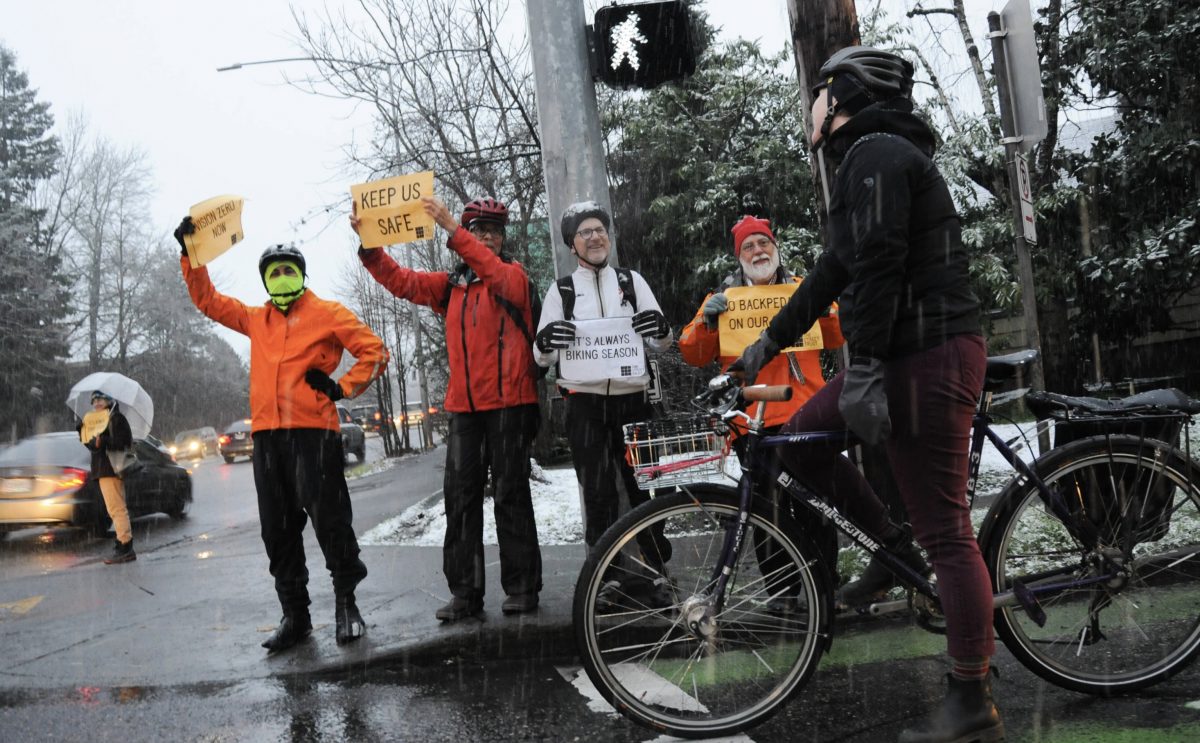
(Photos: Jonathan Maus/BikePortland)
“What we’ve got is a very lived-in new logo and name but we haven’t really built the organization backup behind that.”
— Sarah Iannarone, The Street Trust
The announcement Friday that The Street Trust is hiring four new, full-time staffers marked what could be an exciting new era for the nonprofit formerly known as the Bicycle Transportation Alliance.
The job postings come as the organization is about to share a new strategic plan that will guide the work of both their 501 c3 nonprofit advocacy and their 501 c4 political action committee. It will be the first major initiative of new Interim Executive Director Sarah Iannarone, the former mayoral candidate hired in January with the hope she could do for regional transportation advocacy what she did in her impressive 2020 political campaign.
And The Street Trust desperately needs her help. Turnover is common for small nonprofits, and the pandemic levied a big toll. But The Street Trust’s issues started long before the onset of Covid. Iannarone is the fourth leader of the organization in the last five years. Around the time the organization changed their name in 2016 they had about 15 full time staff. Today they’re down to just three (including Iannarone), and only one who’s been there more than six months.
Advertisement

In 2017 we shared the daunting road ahead for the organization. Four years later, they have a route to guide them down it.
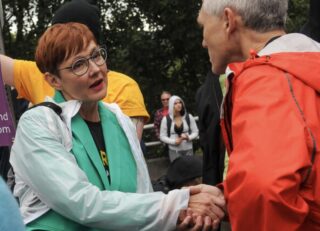
“The Street Trust is building a new team as we prepare to publicly unveil our new Strategic Action Plan – a roadmap to how we intend to win the future of transportation,” reads the optimistic blurb that accompanies the job listings. The strategic plan itself hasn’t been released, but the jobs give us clues about how the new Street Trust will be structured. There are immediate openings for managers of “partnerships”, “member voice”, “grants and impacts”, and “policy transformation”. Each new job aligns directly with one of the group’s four strategic goals.
In an interview this week, Iannarone explained how the organization’s name change impacted its evolution. An everyday rider herself, Iannarone is one of Portland’s most effective cycling advocates. She’s a member of the City of Portland’s Bicycle Advisory Committee and she represents bicycling on the budget advisory committee for the transportation bureau (a position she held before being hired by The Street Trust).
“I’m as pro-cycling as it gets,” she shared in our conversation. “But what I know is that in this new model, we have to think about the whole community… We have to think beyond cyclists.” In Iannarone’s view, taking “Bicycle” out of the organization’s name was a necessary step; but it hurt The Street Trust because they didn’t communicate their intentions well to their existing audience of bicycle lovers. “I think that what happened was they lost some people without building up the people who hadn’t been there before.”
In other words, they alienated people who identify as “cyclists” and hadn’t built up the non-cycling parts of their work. “So what we’ve got is a very lived-in new logo and name but we haven’t really built the organization backup behind that,” is how Iannarone explained it. “This work that I’m doing right now should have probably been done then right? If you’re going to shift over to an organization called ‘The Street Trust’ you can’t just change your name. And you can’t just change your values either.”
Advertisement
“Advocating for an all mode solution, didn’t mean that cyclists, didn’t matter. It just meant that they weren’t the only ones who mattered in this streetscape, anymore.”
— Sarah Iannarone
Iannarone’s perspective is informed by about 60 interviews she had with various stakeholders to learn more about the past and present of the organization. Most of them were “pretty critical”. “I talked with one legislator who said, ‘It just makes me sad to see you not having impact. You’ve got 30 years of advocacy under your belt, why aren’t you having an impact?’ So not squandering that would be pretty important.”
With those voices in her head, Iannarone knows she needs to shore up the organization’s brand not just among local bike riders, but in city hall and Salem offices as well. To do that, she plans to couple the new strategic plan with a communications plan to make sure it’s properly cemented in hearts and minds.
One of the challenges will be to set expectations in the community about what type of work The Street Trust will do. And that it won’t be just about bikes — or any one mode for that matter.
“We made it less about the mode you choose, and more about the outcome,” Iannarone explained. “So when someone says to me, ‘Hey Sarah, are you going to get behind this thing or that thing?’ I’m going to be like: Does it make the streets safer? Is our is our transportation system more accessible and equitable? Are we realizing climate justice?”
Iannarone added that she wanted to make it very clear that, “Advocating for an all mode solution, didn’t mean that cyclists, didn’t matter. It just meant that they weren’t the only ones who mattered in this streetscape, anymore.”
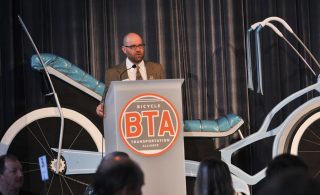
The trick about not being cycling-centric, I replied, is that cycling is a mode of transportation that people very strongly identify with. There’s also a deep historical legacy of bike advocacy, bike advocates, bike culture, and so on. How does an organization capitalize on that cycling magic, while also deprioritizing it?
“That so-called ‘cycling magic’ didn’t happen overnight,” Iannarone answered:
“That was 30 years of advocacy. You had very powerful people like Rex Burkholder and Earl Blumenauer who were able to use their privilege in their position in society to advocate for something that they were passionate about. Where are the champions today using their privilege and their position in society to advocate for what they’re passionate about? I do that. I’ve always been multimodal as long as people have heard about me right? And when I talk about ‘safe streets’ I’m talking about for people moving through them, or sitting on the side of them. And I think that’s one of the reasons why this is a perfect perch for me in the moment; because I can bring that passion and that clarity around why the streets are such a treasure to us and why I care so much about this complete streets model.”
For Iannarone, it’s not just about complete streets, it’s about a complete community. She sees her work as building a new foundation for cycling and transportation advocacy, made up of new faces and voices that will create their own legacy. One that looks a lot different than the one Portland is known for.
One reason for bicycling’s plateau in Portland, in her view, is that a large swath of the city hasn’t been heard from enough. As a former east Portland resident, she knows people who live in that area of town have zero connection to Portland’s reputation as a transportation leader. “They don’t even have streetlights there. TriMet stops are in a ditch, right? So what does it mean for them to see themselves in the Portland transportation story?”
Building a broader movement that looks different than the grey-haired, white faces and hi-viz jackets of past BTA/STreet Trust rallies will be a top priority in the new plan. Speaking of rallies, one of the sources of heartburn about The Street Trust in recent years is how they no longer hold them. Bike Loud PDX launched in 2014 precisely because The Street Trust has gotten so conservative over the years and Portlanders wanted a more aggressive voice for bicycling.
Advertisement
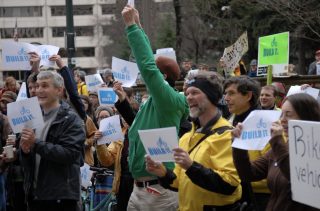
Power in suits and on the streets are both vital to the advocacy ecosystem, and Iannarone said she’ll look to build partnerships to keep that ecosystem healthy. The Street Trust has offered to be the fiscal sponsor of smaller groups like Bike Loud and Families for Safe Streets. Instead of showing up at an intersection, The Street Trust will stay in the background and provide support for groups that do. “I don’t think you can be all things to all people. I think you’ve got to do what you do best.” For The Street Trust that means keeping a laser focus on politics and the policy sausage-making.
How would that play out in a real-world example? Like the controversial Hawthorne Pave & Paint project? I asked Iannarone how The Street Trust would have approached it if these new positions and strategic plan had been in place.
“We would have time to put together the right types of policy recommendations based on research, that was our own research and wasn’t PBOT’s research,” she replied. “We would have had time to work with policymakers and make sure that they felt supported in whatever decision that they were going to make, so they could make choices that were costing them political capital but that were helping them build power behind this movement… Imagine if The Street Trust network was really robust and we sent out a call to action that brought out a diverse set of Portlanders to that issue and it wasn’t necessarily replicating the interests and demographics of the past? That’s going to take work, right? To make sure that everyone sees themselves represented in this work.”
Whether or not Iannarone is around to do that work remains to be seen. She was hired on a contract to complete and launch the strategic plan. I asked how she feels about staying or going. “I feel great about the position. I think it’s a fantastic fit. I hope that my board shares that sense of it and we’ll see whether or not they bring me back for another cycle — or whatever happens next.”
— Jonathan Maus: (503) 706-8804, @jonathan_maus on Twitter and jonathan@bikeportland.org
— Get our headlines delivered to your inbox.
— Support this independent community media outlet with a one-time contribution or monthly subscription.



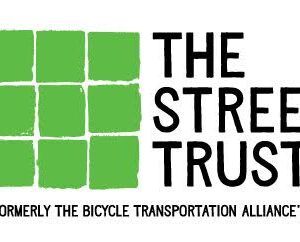
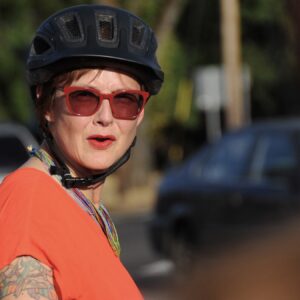
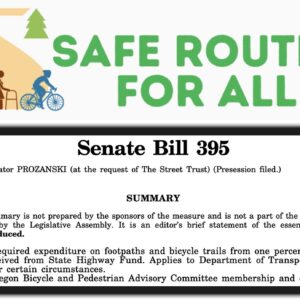
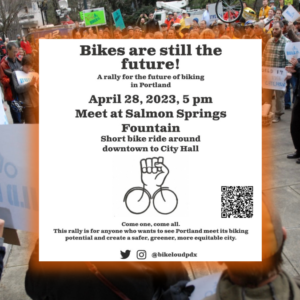
Thanks for reading.
BikePortland has served this community with independent community journalism since 2005. We rely on subscriptions from readers like you to survive. Your financial support is vital in keeping this valuable resource alive and well.
Please subscribe today to strengthen and expand our work.
I commend Sarah for all of her work. But now, we do not have time to massage messages.
We are in the middle of a climate emergency. This is no longer about just preferences, convincing businesses, political capital. This is about justice.
Every day ALL in the city suffer from pollution, whether particulates from burning fuels or the tires themselves. The 4000+ lb vehicles murder people.
Real harm. Real deaths.
The whole world is waking up and taking action. We MUST commit to 50% reductions in our emissions by 2030. Transportation is the lowest hanging fruit.
So. In the next budget, if money is not allocated to meet these goals we must take the city to court. If they continue to harm the citizens, we have legal rights.
Reduce fossil fuel use
Reduce automotive tire use
Reduce vehicular manslaughter
These are binding concepts. If the city/PBOT will not address them they have liability.
The Dutch courts today just sided with the people and will order Shell oil to reduce production of Phase 1, 2 and 3 emissions.
If a private company has that liability, so do our institutions.
Sarah, get thee an army of lawyers. Time to stop wasting precious time.
To your point, the whole world is experiencing an acute mental health crisis over the climate emergency. People desperately want action:
https://news.trust.org/item/20210526120959-puazp
But I prefer to know the truth, no matter how dire. And the truth is it’s already over. The sea ice in the Arctic Ocean will soon be gone for good, probably in the next five years. When we have a blue Arctic, the polar vortex will disappear and the weather as we know it will cease to exist. Temperatures in the world’s breadbaskets will soon exceed 30C regularly on summer days, which will cause all the staple crops to fail. Mass starvation is next, by 2035 at the latest. After that, it’s anyone’s guess, but I don’t want to be around.
People like to pretend they still have choices, and that we are not past the point of no return.
Temperatures in the world’s breadbaskets will exceed 86 F (30 C)?
The horror!!!
Unfortunately Portland will not starve. In fact, large swathes of the USA and Canada will likely become more productive.
If there were any kind of justice in this world, it would be the nations that caused the climate crisis who suffer the most (and not lower-income folk who live closer to the equator).
This is not supported by science.
One of many such studies:
https://royalsocietypublishing.org/doi/full/10.1098/rstb.2010.0158
Did you even read it? From the conclusion:
“Overall, it does not appear to be possible at the present time to provide a robust assessment of the impacts of anthropogenic climate change on global-scale agricultural productivity.”
It says exactly what jimmywoo just said. LOL
https://www.scientistswarning.org/2021/06/15/arctic-death-spiral/
https://www.youtube.com/watch?v=qo3cznpfIpA
“Global-scale” is a strawman.
We lost that battle 20-30 years ago on several levels. Population growth management, technology investments, collective action…none of those things occurred and it is too late.
But the planet will be fine in a few million years. Humanity though, has shat its nest.
I read an article that predicts significant population decline over the next few decades in most countries. The authors were freaking out about lack of employees and slow economic growth. I was ecstatic. Yes, there will be disruptions with population decline, but nothing like the effects of overpopulation.
I find the Dutch court decision very troubling. What next, ordering food manufacturers to cut out the fat and calories from their products? It is social engineering gone amok.
Are you saying you have trouble with a court decision that forces a corporation to behave more responsibly?
They produce fossil-fuel based products. They don’t force anyone to buy them. If you really want to confront the ciimate crisis, you need to confront the demand for harmful products, not the suppliers. They are only doing what their shareholders expect, strive to make a profit.
A paid assassin is also giving the customer what they want.
In retrospect, I actually think that the BTA was ahead of the curve with its name change to The Street Trust. The biggest faux pas was how they rolled out the name change:
First – Big announcement of the name change
Then – Big announcement that their ED was leaving
It probably would have been much more effective to hire the new ED and THEN make the big announcement of the name change (and broadening of their mission).
That whole chain of events seemed like a big cluster and made me question what the heck was going on with the organization.
I look forward to seeing a bold strategic plan. We all know that it’s certainly not coming from any level at the city anytime soon. I will be ecstatic if we can get a bold vision for pedestrians and transit too.
“It just makes me sad to see you not having impact. You’ve got 30 years of advocacy under your belt, why aren’t you having an impact?”
The Street Trust does not have 30 years of advocacy under its belt. It is not the BTA. It has a different name, different mission, different personnel, different tactics. What do the two orgs really have in common? The same tax id?
I liked the BTA, but I am just not interested in the Street Trust. They just seem to be another in a long list of do-little non-profits whose main purpose seems to be self-perpetuation. If they show they can produce good outcomes for cyclists, I’ll reconsider, but that will require actual accomplishments, not just the promise of a new strategic plan and good intentions.
Also, I would never give my money to an organization that doesn’t have their house in order financially: https://www.charitynavigator.org/index.cfm?bay=search.summary&orgid=11886
PS If Iannarone gets hired on as ED, what will she do if Wheeler is recalled?
If the Street Trust wanted to do something useful, they could offer logistical support to BikeLoud; things like a mailing address, a closet, use of a meeting room, etc. It wouldn’t take much to be helpful.
did you read the story? They’ve actually offered to be Bike Loud’s fiscal sponsor. And they’ve also worked with Bike Loud in the past on at least a rally or two.
I read it, and I missed it.
Seems like a very confused organization. They talk of improving transportation for the state but then at the same time their rhetoric seems very Portland-centric. They are going to have to be more inclusive if they want to get anything done in Salem.